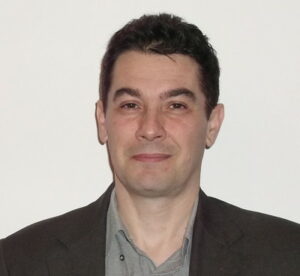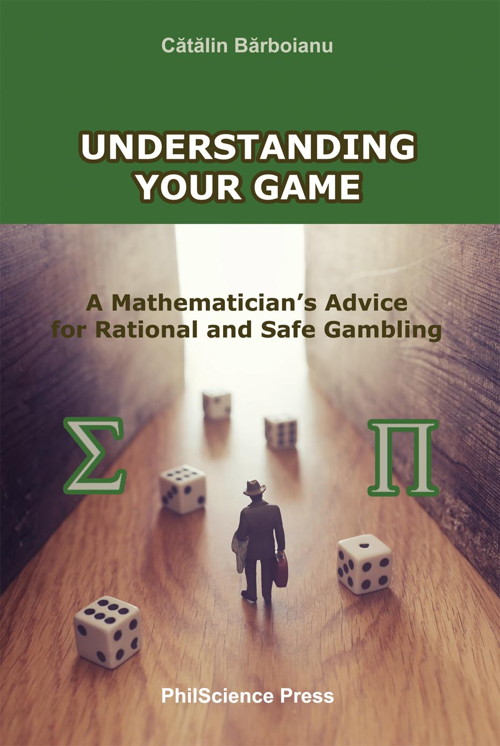 For the last few years at Betting Websites we have been working with a renowned gambling mathematician, Dr. Cătălin Bărboianu. Cătălin has produced several in-depth guides for us relating to probabilities and strategies in poker, roulette, blackjack and other gambling games.
For the last few years at Betting Websites we have been working with a renowned gambling mathematician, Dr. Cătălin Bărboianu. Cătălin has produced several in-depth guides for us relating to probabilities and strategies in poker, roulette, blackjack and other gambling games.
Most of the guides you read around casino games on the internet are not produced by experts and this is why we approached Cătălin to assess real probabilities in well known casino games from a scientific perspective. To say he has done an excellent job would be an understatement.
Cătălin is a mathematician specialising in probability theory, gaming mathematics and cognitive psychology (responsible gambling). He is a research associate at the University of Bucharest, editor-in-chief at Infarom, founder of PhilScience and a consultant for the mathematical aspects of games of chance. He has published 14 books, 10 on the mathematics of gambling, and has published many research articles and designed interdisciplinary research projects.
You do not get to talk to mathematicians much in general life, let alone one that specialises in probability theory and gaming mathematics. Therefore, we decided to interview Cătălin to show our readers what a gambling mathematician does, how they do it and why they do it.
Can you us a bit of background about yourself and how you found your love for mathematics?
I’m both an analytical and a philosophy-inclined person and mathematics by its nature is both analytical and philosophical.
This is why I love it and I do so since I was a kid. I have graduated Mathematics in 1992 at University of Bucharest and earned my PhD in philosophy (of mathematics and of science) 25 years later.
How did you get into studying the mathematics behind gambling games?
I was fascinated by games of chance and by the concept of chance from my youth. In my first university year, a professor who inspired me and influenced my academic path told us in his lecture that one should play the lottery with a line holding the first consecutive numbers. The reason is that people avoid such a line on the fallacious belief that “it’s impossible” to be drawn.
The truth is that such a line has the same probability of being drawn as any other and, for the former, if you win, you will get a higher prize than in the former case, as the prize fund would be divided to fewer players.
With this tale, I realised that gambling mathematics is more complex than the formal mathematics of probability theory. It has cognitive, psychological and philosophical aspects, and gamblers would benefit if someone with adequate expertise in this interdisciplinary field would share their knowledge.
You have written 10 books on the mathematics of gambling, what is the first one that someone should buy and why?
Most of my gambling books are specialised on stand-alone topics (the math of Hold’em, lottery, slots, and roulette). If I were to recommend gamblers one to start with, that would be my last – Understanding Your Game: A Mathematician’s Advice for Rational and Safe Gambling (pictured below).

The adequate understanding of the mathematical facts of gambling can prevent the development of various harmful misconceptions among gamblers. We have to play safely before playing strategically.
Can you tell us a bit about the research projects you have done and what your major findings were?
My research has run in the fields of philosophy of science and problem gambling. In problem gambling, I guess my main finding was that knowing the formal mathematics behind the games is not sufficient for correcting the gambling misconceptions and fallacies, and an interdisciplinary approach is needed, where cognitive psychology and philosophy of mathematics are involved.
What future projects do you have planned?
My focus is to develop projects by which my findings in problem gambling to come being incorporated in the real world of gambling. This includes the clinical-institutional sector (counsellors, help organisations, gambling policy makers), but also the gambling industry.
Even though the importance of gambling math has been established, there is still reluctance in adopting it as a cognitive tool. I am keen to see this changed. In particular, gambling websites (including authoritative ones) do not reflect adequately the mathematical dimension of gambling.
What is it about probabilities that you like so much?
Probability theory is something formal and cold, as any mathematical theory. But when applying it to the real world (including in gambling), it gets surprising philosophical interesting aspects. Philosophers never solved them.
Mathematically speaking, probability is just a measure. In the real life, it is the most objective tool in decision making, even if it is not something certain. As such, we should both trust and not trust probability.
Do you find there is a negative view of gambling in your professional circles?
Not at all. Although gambling is seen many times as a stigmata in the civil society, in the academic realm is an object of investigation.
Just do a search on Google academic by keyword ‘gambling’ and you will get millions of papers having gambling as topic, spanning various fields, such as mathematics, applied mathematics, psychology, and economics.
What gambling game is your favourite from a mathematical point of view and why?
I guess poker. It is the only game for which complete optimal strategies have not been devised, although, by its nature, poker would allow such strategies. Blackjack is a closed chapter in this respect, with the work of Edward Thorpe and his followers.
Poker is not, just because the psychological aspects of poker are difficult (or impossible) to be quantified mathematically. In fact, I have planned a research on this topic but don’t know yet when it will be pursued.
What is your favourite gambling game (if different from above) and why?
In my youth I was fascinated by roulette. It is a transparent game in regard to both its design and outcomes.
I hate slots, just because their configuration is hidden and they are the most addictive casino games. Yet I am not a player of any game.
What are the easiest and hardest games to calculate probabilities for when playing live?
No probability computation is possible when playing live in any game due to the short time available, except perhaps for roulette and dice games. As for the hardest, card games like poker and blackjack. Probabilities involved in these games are computed by using complex mathematical techniques.
Fortunately, a lot of resources are available on the internet (such as this very site) or in books for such information; consulting them and memorising as much as possible numbers before playing is a skill itself.
What is the one mathematical technique that would recommend to normal players that can make a difference to their play?
Each game has its own particularity in regard to strategy. There is no general mathematical strategic advice, except optimal play for the games that allow it. However, getting informed about the game and its mathematical aspects makes a difference in adjusting one’s gambling behaviour or strategy.
But playing by optimal strategy, as in blackjack, can only make a difference over the long run. Even playing by optimal strategy does not guarantee monetary success.
Do mathematicians gamble more (or possibly less?) than other academics?
I asked myself the same question. I guess less. Obviously, they know more about the games than others do. If they gamble, perhaps they do it for fun and not for monetary gain. But there are exceptions, of course.
You also have expertise in cognitive psychology and problem gambling. Can you tell us about the most important psychological factors that can lead to problem gambling?
There are several risk factors that can lead to problem gambling. Most of them are socio-psychological. For instance, people with a traumatic childhood, or drug-alcohol addicted, or even those experiencing professional failure, are more likely to develop a problematic gambling behaviour.
There are also cognitive risk factors, such as the gambling-related misconceptions, fallacies and irrational beliefs; they are also related to the understanding of the mathematical facts of gambling.
Do you think people who use mathematics to win games are ‘cheats’ or just taking advantage? (On the basis that casinos ban card counters, etc.).
Mathematics cannot be used to win, in the sense that it does not guarantee success. But its use can lead to taking advantage in one’s play. Cheating is when you come from home with aces in your sleeve.
Casino cannot rule over what players get to know or learn or what they do with their own minds. Casinos are not justified in banning card counters, as long as this is not a cheat, but a skill.
If you would like to understand a little more about what goes on in the head of a mathematician like Cătălin’s then the best way is to read some of the articles he has written for us. Or you could purchase one of his books for a wider insight.
